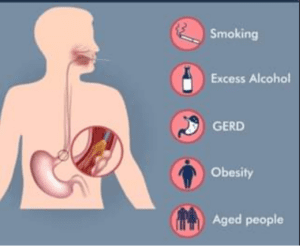Esophageal Cancer - Kaizen Hospital
April is Esophageal Cancer Awareness Month. Let’s talk about risk factors of Esophageal Cancer.
Individual’s risk of developing esophageal cancer during his or her lifetime is 0.5 percent. Five-year survival rate for esophageal cancer is an average 20 percent.
Types of esophageal cancer:
- Squamous cell carcinoma, which typically affects the upper and middle part of the esophagus
- Adenocarcinoma, which usually occurs in the lower part of the esophagus
Esophageal cancer often does not cause symptoms in its early stages. However, as it progresses individuals can experience:
- Difficult or painful swallowing
- Weight loss
- Hoarseness
- Cough that does not go away
- Indigestion or Heartburn
- Vomiting
Because symptoms usually do not appear until the disease is advanced, esophageal cancer is also one of the most difficult cancers to treat.
Risk factors for esophageal cancer includes:
- Smoking
- Drinking alcohol
- Having Long-term acid reflux or gastroesophageal reflux disease (GERD)
- Barrett’s esophagus
- Obesity
- Poor nutrition

Men are also approximately three times more likely to develop esophageal cancerthan women.
Prevention:
- Avoid using tobacco products
- Stop consuming alcohol
- Treat obesity
- Get treated for reflux or Barrett’s esophagus
- Eating non-starchy vegetables and whole fruit probably lowers risk.
- Regular physical activity lowers risk

Having one or all of these risk factors does not mean that one will develop esophageal cancer. Also, not having any risk factors does not mean that one will never develop esophageal cancer. Raising awareness of risk factors associated with esophageal cancer is one way to help reduce the incidence of an esophageal cancer. People who are considered to be at an elevated risk should consult their doctor immediately about getting screened as early as possible.
Early detection can improve the chances of survival if cancer is found in the esophagus. There are also more treatment options available for early esophageal cancer and better outcomes.
Author :- Dr. Mayankkumar Gurjar
MBBS, MS, M.Ch (Surgical Gastroenterology)
Kaizen Hospital


-min.jpg)
Comments
Post a Comment